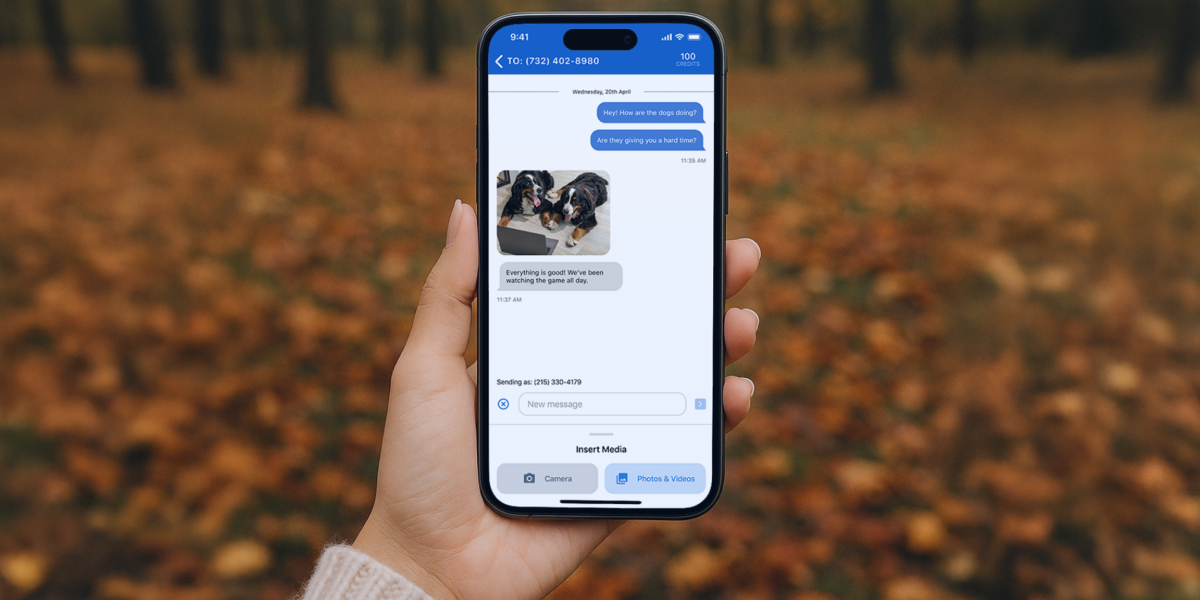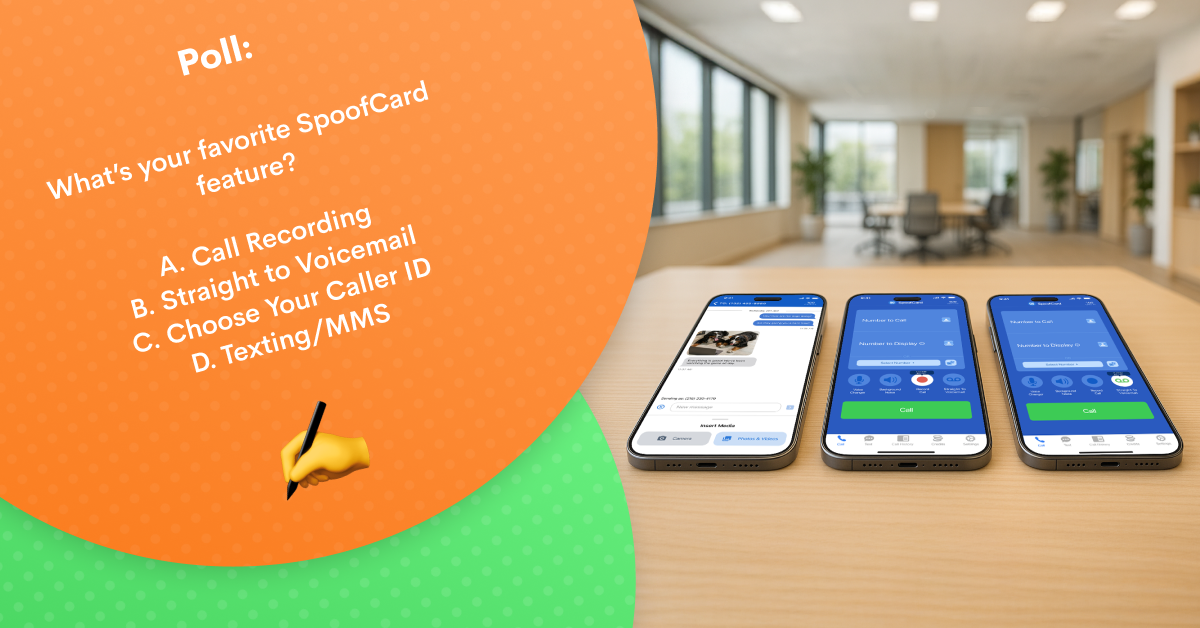Navigating the Rise of AI in Cybersecurity: What It Means for Your Personal Data with SpoofCard
SpoofCard Blog • October 18, 2024

The digital landscape is rapidly evolving, especially the use of artificial intelligence. While AI has significantly advanced the ability to identify and combat cyber threats, it has also introduced new risks that could affect your personal data. Understanding how AI is transforming cybersecurity—and what that means for services like SpoofCard—is essential to staying protected in an increasingly connected world.
How AI is Changing the Cybersecurity Landscape
Traditionally, cybersecurity relied on predefined rules and human intervention to detect and stop threats. However, as cyberattacks become increasingly more sophisticated, AI is being used to make defense systems faster and more efficient. Here’s how AI is reshaping cybersecurity and how it could impact services like SpoofCard:
- Faster Threat Detection: AI-powered tools process large amounts of data in real-time, allowing for quicker detection of threats. They identify patterns and anomalies that might signal a cyberattack, often before it happens. This means platforms like SpoofCard, which prioritize privacy and user safety, benefit from AI’s ability to detect potential security breaches early on.
- Adaptive Security Systems: AI systems learn and adapt over time, becoming better at detecting new and evolving threats. With machine learning algorithms, cybersecurity defenses evolve based on the latest data. SpoofCard leverages this adaptive technology to keep its systems up to date against the latest cyberattacks, ensuring user information remains secure.
- Automated Responses to Threats: When a potential security breach is detected, AI can automatically respond by taking preemptive measures, such as isolating compromised systems or blocking suspicious activity. For SpoofCard users, this means personal data can be protected even if the threat is detected in real-time, without users having to take action.
How SpoofCard Protects Your Personal Data
However, while AI is a powerful tool for defense, it also presents new challenges. Cybercriminals may use AI for malicious purposes, making it essential to stay informed about how your data could be affected—even when using privacy-focused services like SpoofCard. AI-powered cyberattacks, privacy concerns around data transparency, and AI systems that are trained on biased or incomplete data have all been raised as potential issues with AI.
As AI becomes more integrated into both security systems and potential threats, SpoofCard has and will continue to take proactive steps to safeguard your personal data. Here’s what SpoofCard is doing to ensure your information stays protected:
- AI-Enhanced Security Solutions: SpoofCard incorporates AI into its security infrastructure, ensuring that any unusual activity is flagged and addressed immediately. With AI’s ability to monitor real-time data, SpoofCard can quickly detect suspicious behavior and respond to potential breaches before they escalate.
- Commitment to Privacy: SpoofCard remains dedicated to transparency in its privacy policies. Understanding how your data is collected, processed, and protected is a core part of SpoofCard’s service, especially as AI technologies evolve. By staying transparent about how AI is used, SpoofCard helps users stay informed and in control of their information.
- Regular Monitoring for Unusual Activity: SpoofCard encourages users to monitor their accounts regularly, and with AI-powered alerts, users can receive notifications if any suspicious activity occurs. This extra layer of security helps you remain aware of any potential risks to your account.
- End-to-End Encryption: SpoofCard employs end-to-end encryption to ensure that your personal data and communications are protected. This means that your sensitive information is secure and inaccessible to unauthorized parties—even in the face of AI-driven cyberattacks.
Staying Safe in an AI-Driven World
As AI continues to reshape the cybersecurity landscape, services like SpoofCard are evolving to stay ahead of the curve. It's also important for you as the user to remain vigilant online. Here’s what you can do to protect your data when using any digital service:
- Enable Security Alerts: Take advantage of security features by enabling alerts that notify you of any unusual activity so you’ll know immediately if something seems off with your account. This usually comes in the form of push notifications, emails, SMS, or any combination of the three.
- Use Strong Passwords and Two-Factor Authentication: While AI can detect threats, simple security measures like strong, unique passwords and two-factor authentication still go a long way in protecting your data. SpoofCard offers these features to help keep your account safe.
- Stay Updated on Privacy Practices: As AI evolves, so do the practices around data collection and privacy. Keep an eye on updates to your services to ensure you’re aware of any changes that might affect your personal data.
- Be Cautious with Your Digital Footprint: While SpoofCard helps protect your privacy, it’s important to remain mindful of the information you share online. Limit unnecessary sharing of personal details and be cautious when interacting with unfamiliar links or requests.
AI is transforming cybersecurity, bringing both enhanced protection and new challenges. For platforms like SpoofCard, AI represents an opportunity to provide even more robust data security, while also requiring increased vigilance as cybercriminals develop new AI-driven threats. By staying informed and taking proactive steps—such as using SpoofCard’s security features, monitoring your account, and adopting best practices—you can better navigate this new era of cybersecurity and ensure your personal data remains secure.

The holiday season is all about connection: catching up with family, sending warm wishes to friends, and staying in touch while traveling. But let’s be honest; not every call or message is merry and bright. Between juggling relatives, managing business during a busy month, and staying safe online, sometimes you need a little help keeping your communication stress-free. That’s where SpoofCard comes in. Think of it as your digital holiday helper making sure you stay connected on your terms this December. How can SpoofCard help? 1. Send Holiday Greetings Without Sharing Your Number Whether you’re texting holiday wishes to coworkers, vendors, or distant acquaintances, your personal number doesn’t need to be part of the gift. SpoofCard’s number masking feature lets you keep your information private while still spreading holiday cheer. 2. Call Over Wi-Fi While You Travel Headed out of town for the holidays? Airport Wi-Fi or your cousin’s guest room connection is all you need to make and receive calls through SpoofCard’s Wi-Fi calling. Stay in touch without roaming charges or relying on spotty cell service. 3. Use Straight to Voicemail for Boundary-Friendly Family Convos We love our families, but sometimes the holidays come with… extra conversations. If you want to share a thoughtful message without getting pulled into a never-ending chat, SpoofCard’s Straight to Voicemail feature is your best friend. Deliver the update, avoid the drama. 4. Add Fun to Your Festivities Not all calls have to be serious. SpoofCard’s voice changer adds a playful touch—perfect for surprising friends with a Santa impression or adding a little extra magic for the kids. Because privacy tools can be fun, too. This December, stay safe, stay merry, and keep your connections on your terms. The holidays are about joy, connection, and making memories—not stress about your phone number or phone bill. With features like number masking, Wi-Fi calling, Straight to Voicemail, and even a little holiday fun with the voice changer, SpoofCard keeps you in control of how you connect. Make SpoofCard your holiday helper today.

When you’re running a small business, side hustle, or freelance gig, every detail matters—from branding and customer service to how you communicate. One detail often overlooked? Phone privacy. Sharing your personal number for business can blur boundaries, invite spam, and make it harder to unplug. That’s where SpoofCard comes in, giving small businesses and freelancers the tools to stay professional and protected. Why Privacy Matters for Entrepreneurs Unlike large companies with call centers and dedicated lines, small business owners often juggle everything from their personal phone. That can lead to missed opportunities or, worse, unwanted intrusions into personal life. By separating business and personal communication, you gain: Professionalism: Present a polished, consistent contact number to customers. Control: Decide who reaches you, when, and on which line. Peace of Mind: Protect your personal number from exposure, spam, or misuse. Multiple Caller IDs = Multiple Hats As a freelancer or small shop owner, you wear a lot of hats. With SpoofCard’s multiple caller ID options, you can match your number to the situation. For example: Use one number for client calls so you’re always polished and professional. Keep another for marketplace sales or seasonal gigs. Retain your personal number for family and friends . Switching between numbers with SpoofCard is seamless, allowing your business to look bigger while your personal life stays private. The Web App: Your Business Command Center For professionals who live on their laptops, SpoofCard’s web app is a game-changer. You can call and text right from your browser—perfect for freelancers working from coffee shops, small business owners managing multiple clients, or gig workers coordinating with customers. It’s one dashboard where everything stays organized and secure. Real-World Scenarios Freelance Designers: Share a business number on your portfolio site without risking personal exposure. Small Shop Owners: Give employees or seasonal staff access to a shop line without handing out your personal phone. Gig Workers: Whether you’re tutoring, consulting, or doing seasonal deliveries, keep client communication professional and contained. Ready to separate business from personal? Try SpoofCard today and take control of your calls.

We’ve all been there, hovering over the call button, knowing a conversation needs to happen but dreading the awkwardness that comes with it. That’s where SpoofCard’s Straight to Voicemail feature steps in. You can deliver your message directly to their voicemail instead of ringing someone’s phone and risking an unprepared or uncomfortable exchange. No interruptions. No pressure. Just clear communication on your terms. When Straight-to-Voicemail Saves the Day 1. Breaking Bad News (Gracefully) Not every update is easy to share. Whether you’re canceling plans, announcing a delay, or letting someone know about a decision they won’t love, voicemail gives you space to be thoughtful without the tension of an immediate reaction. 2. Dodging Persistent Relatives (With Love) We all have them—the family members who mean well but turn a quick check-in into an hour-long saga. With Straight to Voicemail, you can leave a kind message while keeping your evening intact. It’s the balance between staying connected and setting boundaries. 3. Professional Outreach (On Your Terms) Job seekers, freelancers, and entrepreneurs often need to contact potential clients or employers. Leaving a professional voicemail can make a strong impression, but sometimes you don’t want the uncertainty of catching someone live. Straight to Voicemail ensures you say precisely what you mean, without nerves derailing the delivery. 4. Avoiding the Awkward “Talk” From ending a situationship to declining a commitment, some conversations are easier to record than to hash out in real time. Straight to Voicemail helps you skip the stumbles and keep things respectful. Why It Works At its core, Straight to Voicemail gives you control. You decide the timing, tone, and content of the message, and the recipient can listen when they’re ready. It’s communication without confrontation—perfect for moments when live calls feel like too much.

Important Update: AnyID Changes Begin November 5, 2025 In light of recent FCC regulations, we’re making updates to ensure SpoofCard and its features remain fully compliant and secure. Starting November 5, AnyID will undergo changes to meet these new requirements. AnyID will only be available for business accounts moving forward. To continue using SpoofCard, you can use the drop-down menu or verify your caller ID, as shown below: ✅ Numbers from our drop-down menu

The change of seasons always brings a chance to reset, and autumn is a season of transition. Kids head back to school, routines shift, and new projects start. But as you swap out summer sandals for cozy boots and refresh your wardrobe with warm layers, remember that fall is the perfect time to reevaluate your digital habits. One of the easiest ways to protect your privacy and give yourself a fresh start this season? A new phone number with SpoofCard. Where a Fresh Number Makes Sense 1. Online Marketplaces Fall is a prime time to sell items from your summer clean-out or browse for seasonal deals for your own home. However, listing your real number on Craigslist, Facebook Marketplace, or other platforms comes with risks. With SpoofCard, you can reply safely, knowing your personal number isn’t exposed. 2. Seasonal Gigs & Side Hustles Plenty of short-term opportunities pop up this time of year, from tutoring to fall festivals. Using a dedicated number for seasonal jobs helps you keep work and personal life separate and makes it easy to step away when the gig is over. 3. Dating Apps Whether you’re diving back into the dating scene or simply want to protect your privacy while getting to know someone, SpoofCard gives you control. Share a temporary number instead of your personal one to decide who stays in your life. SpoofCard Puts You in Control Your phone number is often the key to your identity, and SpoofCard ensures you stay in charge of who has access to it. With features like number masking, Straight to Voicemail, and voice-changing options, you can communicate confidently and privately, no matter the season. This fall, reset more than your wardrobe. Reset your privacy with SpoofCard.

SpoofCard keeps your number protected no matter where life takes you. When You Travel: Use a custom caller ID Text from temporary numbers Send unknown calls to voicemail Access the app from multiple devices When You Work: Record important calls Use professional caller IDs Keep voicemails organized Text with attachments Add background noise to maintain privacy When You Relax: Send calls to voicemail with one tap Change numbers easily Manage everything from home or on the go SpoofCard supports your lifestyle on a beach, at a desk, or at home watching a good show. Download today and stay in control of your number, wherever you are.

Based on user feedback, here are SpoofCard’s top features and when to use them: Call Recording: Great for keeping records of interviews, agreements, or even memorable messages. Remember to always check local laws before recording. Straight to Voicemail: Skip the small talk. Send calls straight to voicemail and reply when you’re ready. Choose Your Caller ID: Present different numbers for different situations: business, personal, or travel. MMS & Texting: Send messages, images, and attachments from alternate numbers. This is ideal for online sales or dating apps! With SpoofCard, you get all of these built into one app that puts you in complete control of your communications!

With SpoofCard’s Voice Changer, you can decide exactly how you sound on a call. Change the Way You Sound You can switch between male and female voice filters instantly before each call. It’s simple, seamless, and part of the core SpoofCard experience. Use it for… Privacy: Stay anonymous while communicating with online buyers or new contacts. Business: Use different voices for multiple roles or client personas. Fun: Add flair to prank calls, skits, or podcast segments Just be sure to use it responsibly! How to Use: Open SpoofCard Choose your number Tap Voice Changer Select your voice filter Make your call Your voice, your rules. Try the Voice Changer today and see how far your conversations can go.

From flip phones to complete control, SpoofCard is officially 20 years old. Since the early 2000s, we’ve helped millions protect their number and communicate on their terms. 2005–2010: The Birth of SpoofCard Launched during the age of flip phones, SpoofCard gave users a way to control the number displayed when making a call. Small business owners, online sellers, and privacy-minded users were early adopters. 2011–2017: Mobile Growth With smartphones rising, we introduced texting from alternate numbers, call recording, and web-based access. The app evolved alongside our users’ growing needs. 2018–2022: Privacy Takes Center Stage As robocalls and data breaches made headlines, SpoofCard expanded with voicemail routing, enhanced security, and user-friendly updates. New tools like Background Sounds and Straight to Voicemail joined the mix. 2023–2025: 20 Years and Counting Today, SpoofCard is a full-featured privacy app. From masking calls to recording conversations and texting from multiple numbers, it's trusted by users like Nia: “I’ve used SpoofCard through job changes, moves, and online dating. It’s kept my number safe and my life sane.” Thanks for 20 Years To our users and team: thank you. Your trust has powered two decades of innovation. Here’s to the next chapter!

Sometimes, talking on the phone just isn’t the move. Maybe you’re juggling five tasks. Perhaps you're avoiding that overly chatty cousin. Or maybe you're simply not in the mood for real-time conversation. That’s where SpoofCard’s Straight to Voicemail feature comes in. Silence Isn’t Avoidance—It’s a Strategy Sending a call straight to voicemail isn’t about dodging responsibility. It’s about setting boundaries. Picture this: You’re focused on work and don’t want to break your momentum. You want to screen a new contact before deciding to call back. You’re traveling and avoiding roaming interruptions. You're relaxing and don’t want a phone call to derail your peace. With one tap, you can send a call to voicemail—no awkward declines, no pressure. Behind the Feature: Meet Kyle One of our support team pros, Kyle, is a champion of this feature. In his words: “It helps me get my message across without needing to talk to anyone.” Kyle keeps boundaries intact with Straight to Voicemail, whether working or winding down. When Less Talk = More Power Using voicemail to communicate on your terms can: Reduce anxiety Keep your schedule on track Filter unknown or spam calls Give you space to respond when you're ready With SpoofCard, just toggle “Straight to Voicemail,” and your caller hears your voicemail greeting while you get to respond on your terms. Be Unavailable, On Purpose Being reachable doesn't mean being constantly available. With SpoofCard, setting boundaries becomes second nature. Download SpoofCard today and skip the conversation with confidence.



